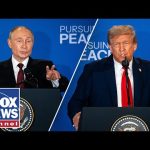In a recent analysis of the high-stakes meeting between President Trump and Vladimir Putin, insights shed light on the complex dynamics of international relations. The encounter was notably different from previous meetings, where the atmosphere usually buzzed with straightforwardness and open communication. This time, things were notably more subdued, which raises eyebrows and ignites curiosity regarding what truly transpired behind closed doors. Observers are reminded not to read too much into the façade, as the focus should rest squarely on the actions that follow.
As geopolitical tensions remain high, former Secretary of State Mike Pompeo emphasized that words from the Kremlin should be taken with a grain of salt. The important part, he suggested, is keeping an eye on Russia’s movements—especially concerning Ukraine. Will missiles illuminate the skies of Ukraine again tonight, or has a ray of hope for a cease-fire emerged? While conversations swirl around diplomacy, Pompeo’s instincts raise valid concerns about what´s at stake for both nations.
Adding to the complexities of this gathering, there’s speculation that if President Biden’s approach had been different, the conflict may have been avoided entirely. Trump himself has echoed sentiments suggesting that a firmer stance during his administration could have prevented the current predicament. The irony seems to linger as past reflections of the Cold War were invoked, encapsulating the tenuous relationship between Russia and the U.S. while also alluding to America’s historical sacrifices during times of great need.
Interestingly, Putin’s suggestion to hold the next meeting in his turf of Moscow stirred quite a reaction. While such an invitation could have been seen as a friendly gesture in some contexts, many think it’s a strategic move on Putin’s part to gain an upper hand. It’s clear that President Trump, equipped with his distinct negotiation style, won’t simply agree to any terms that risk American interests. The anticipated attendance of Ukrainian President Zelensky at any future engagements is a crucial factor, as not having him at the table could compromise his country’s sovereignty and voice.
In the aftermath of the summit, as discussions brew about the next steps, the narrative continues to evolve. Pompeo encourages everyone to remain vigilant, not just in terms of dialogue but also the actions that may follow. If Putin chooses aggression over diplomacy, the weight of their discussions may become significantly less consequential. For now, hope springs eternal that the two sides can negotiate a pathway to peace, at least temporarily halting the missiles flying over Ukraine while they navigate through this diplomatic labyrinth. But for anyone following these developments, one thing is certain: the coming hours and days will be as critical as the discussions that just took place.




